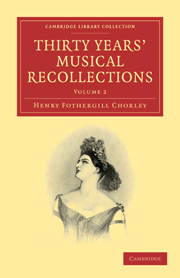Book contents
- Frontmatter
- Contents
- THE YEAR 1847
- THE YEAR 1848 (Her Majesty's Theatre.)
- THE YEAR 1848 (Royal Italian Opera.)
- THE YEAR 1849 (Her Majesty's Theatre.)
- THE YEAR 1849 (Royal Italian Opera.)
- THE YEAR 1850 (Her Majesty's Theatre.)
- THE YEAR 1850 (Royal Italian Opera.)
- THE YEAR 1851 (Her Majesty's Theatre.)
- THE YEAR 1851 (Royal Italian Opera.)
- THE YEAR 1852 (Her Majesty's Theatre.)
- THE YEAR 1852 (Royal Italian Opera.)
- THE YEAR 1853 (Royal Italian Opera.)
- THE YEAR 1854 (Royal Italian Opera)
- THE YEAR 1855 (Royal Italian Opera.)
- THE YEAR 1856 (Her Majesty's Theatre.)
- THE YEAR 1856 (Royal Italian Opera.)
- THE YEAR 1857 (Royal Italian Opera.)
- THE YEAR 1857 (Her Majesty's Theatre.)
- THE YEAR 1858 (Her Majesty's Theatre.—Royal Italian Opera.—Drury Lane.)
- THE YEAR 1859 (Royal Italian Opera.—Drury Lane.)
- The Last Chapter
THE YEAR 1851 (Royal Italian Opera.)
Published online by Cambridge University Press: 29 August 2010
- Frontmatter
- Contents
- THE YEAR 1847
- THE YEAR 1848 (Her Majesty's Theatre.)
- THE YEAR 1848 (Royal Italian Opera.)
- THE YEAR 1849 (Her Majesty's Theatre.)
- THE YEAR 1849 (Royal Italian Opera.)
- THE YEAR 1850 (Her Majesty's Theatre.)
- THE YEAR 1850 (Royal Italian Opera.)
- THE YEAR 1851 (Her Majesty's Theatre.)
- THE YEAR 1851 (Royal Italian Opera.)
- THE YEAR 1852 (Her Majesty's Theatre.)
- THE YEAR 1852 (Royal Italian Opera.)
- THE YEAR 1853 (Royal Italian Opera.)
- THE YEAR 1854 (Royal Italian Opera)
- THE YEAR 1855 (Royal Italian Opera.)
- THE YEAR 1856 (Her Majesty's Theatre.)
- THE YEAR 1856 (Royal Italian Opera.)
- THE YEAR 1857 (Royal Italian Opera.)
- THE YEAR 1857 (Her Majesty's Theatre.)
- THE YEAR 1858 (Her Majesty's Theatre.—Royal Italian Opera.—Drury Lane.)
- THE YEAR 1859 (Royal Italian Opera.—Drury Lane.)
- The Last Chapter
Summary
It may be here said, that the virtual abandonment of the ballet at Covent Garden, except as an accessory to grand Opera, or merely as filling half an hour in an evening's performance, makes further record of dances and divertissements unnecessary.—Interest in dancing seems for the present to have died out in London.—In fact, wherever a strong and wholesome taste for dramatic music increases;—the other entertainment must hold a secondary place,—unless some new Genius should appear, like Mdlle. Taglioni, to delight us with her modest and poetical grace,—or like Mdlle. Fanny Elssler, by her union of brilliant execution and admirable pantomime.
The foregoing list of operas will show an increase of the tendency towards works of the German school. In its second season, however, the Italianized version of “Der Freischütz” proved unattractive, in spite of the appearance of Signor Tamberlik in the tenor part.—Nor could the same artist's excellent singing as Florestan overcome the apathy of the public to the version of “Fidelio,” performed in Covent Garden for the first time.—The audience encored one of the magnificent four “Leonora” overtures prefixed to the second act; but the performance, as a whole, was, somehow, not right—not German;—careful, but languid.—Madame Castellan did her utmost to be womanly; but she was neither sufficiently intense nor touching as Leonora, and the music tore her voice—an organ which had never been altogether regulated.
- Type
- Chapter
- Information
- Thirty Years' Musical Recollections , pp. 144 - 166Publisher: Cambridge University PressPrint publication year: 2009First published in: 1862



